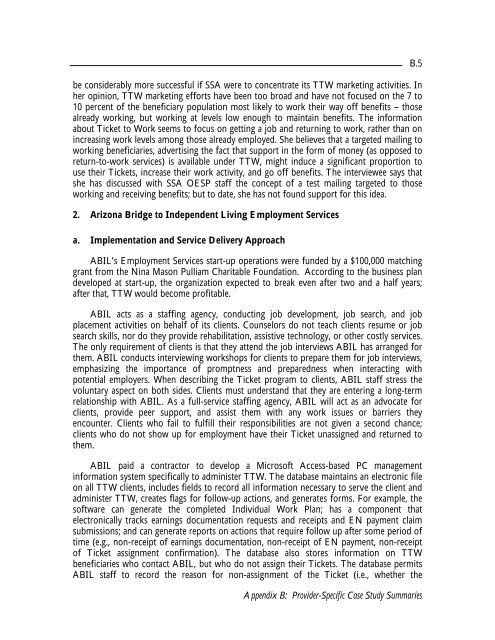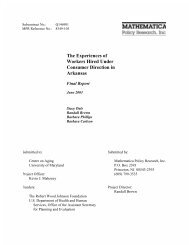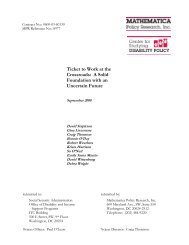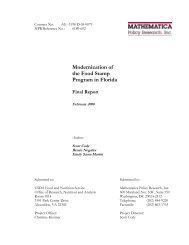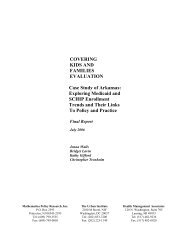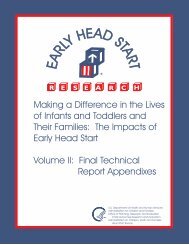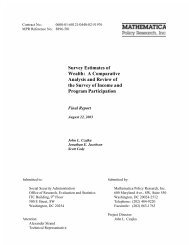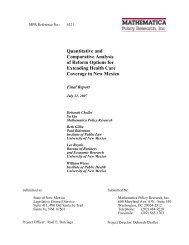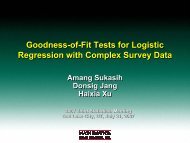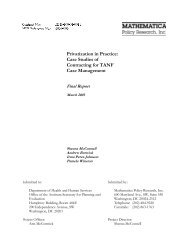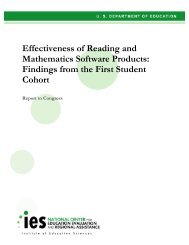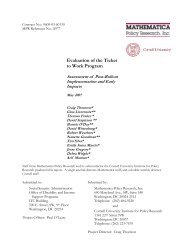Evaluation of the Ticket to Work Program Initial Evaluation Report
Evaluation of the Ticket to Work Program Initial Evaluation Report
Evaluation of the Ticket to Work Program Initial Evaluation Report
Create successful ePaper yourself
Turn your PDF publications into a flip-book with our unique Google optimized e-Paper software.
e considerably more successful if SSA were <strong>to</strong> concentrate its TTW marketing activities. In<br />
her opinion, TTW marketing efforts have been <strong>to</strong>o broad and have not focused on <strong>the</strong> 7 <strong>to</strong><br />
10 percent <strong>of</strong> <strong>the</strong> beneficiary population most likely <strong>to</strong> work <strong>the</strong>ir way <strong>of</strong>f benefits – those<br />
already working, but working at levels low enough <strong>to</strong> maintain benefits. The information<br />
about <strong>Ticket</strong> <strong>to</strong> <strong>Work</strong> seems <strong>to</strong> focus on getting a job and returning <strong>to</strong> work, ra<strong>the</strong>r than on<br />
increasing work levels among those already employed. She believes that a targeted mailing <strong>to</strong><br />
working beneficiaries, advertising <strong>the</strong> fact that support in <strong>the</strong> form <strong>of</strong> money (as opposed <strong>to</strong><br />
return-<strong>to</strong>-work services) is available under TTW, might induce a significant proportion <strong>to</strong><br />
use <strong>the</strong>ir <strong>Ticket</strong>s, increase <strong>the</strong>ir work activity, and go <strong>of</strong>f benefits. The interviewee says that<br />
she has discussed with SSA OESP staff <strong>the</strong> concept <strong>of</strong> a test mailing targeted <strong>to</strong> those<br />
working and receiving benefits; but <strong>to</strong> date, she has not found support for this idea.<br />
2. Arizona Bridge <strong>to</strong> Independent Living Employment Services<br />
a. Implementation and Service Delivery Approach<br />
ABIL’s Employment Services start-up operations were funded by a $100,000 matching<br />
grant from <strong>the</strong> Nina Mason Pulliam Charitable Foundation. According <strong>to</strong> <strong>the</strong> business plan<br />
developed at start-up, <strong>the</strong> organization expected <strong>to</strong> break even after two and a half years;<br />
after that, TTW would become pr<strong>of</strong>itable.<br />
ABIL acts as a staffing agency, conducting job development, job search, and job<br />
placement activities on behalf <strong>of</strong> its clients. Counselors do not teach clients resume or job<br />
search skills, nor do <strong>the</strong>y provide rehabilitation, assistive technology, or o<strong>the</strong>r costly services.<br />
The only requirement <strong>of</strong> clients is that <strong>the</strong>y attend <strong>the</strong> job interviews ABIL has arranged for<br />
<strong>the</strong>m. ABIL conducts interviewing workshops for clients <strong>to</strong> prepare <strong>the</strong>m for job interviews,<br />
emphasizing <strong>the</strong> importance <strong>of</strong> promptness and preparedness when interacting with<br />
potential employers. When describing <strong>the</strong> <strong>Ticket</strong> program <strong>to</strong> clients, ABIL staff stress <strong>the</strong><br />
voluntary aspect on both sides. Clients must understand that <strong>the</strong>y are entering a long-term<br />
relationship with ABIL. As a full-service staffing agency, ABIL will act as an advocate for<br />
clients, provide peer support, and assist <strong>the</strong>m with any work issues or barriers <strong>the</strong>y<br />
encounter. Clients who fail <strong>to</strong> fulfill <strong>the</strong>ir responsibilities are not given a second chance;<br />
clients who do not show up for employment have <strong>the</strong>ir <strong>Ticket</strong> unassigned and returned <strong>to</strong><br />
<strong>the</strong>m.<br />
ABIL paid a contrac<strong>to</strong>r <strong>to</strong> develop a Micros<strong>of</strong>t Access-based PC management<br />
information system specifically <strong>to</strong> administer TTW. The database maintains an electronic file<br />
on all TTW clients, includes fields <strong>to</strong> record all information necessary <strong>to</strong> serve <strong>the</strong> client and<br />
administer TTW, creates flags for follow-up actions, and generates forms. For example, <strong>the</strong><br />
s<strong>of</strong>tware can generate <strong>the</strong> completed Individual <strong>Work</strong> Plan; has a component that<br />
electronically tracks earnings documentation requests and receipts and EN payment claim<br />
submissions; and can generate reports on actions that require follow up after some period <strong>of</strong><br />
time (e.g., non-receipt <strong>of</strong> earnings documentation, non-receipt <strong>of</strong> EN payment, non-receipt<br />
<strong>of</strong> <strong>Ticket</strong> assignment confirmation). The database also s<strong>to</strong>res information on TTW<br />
beneficiaries who contact ABIL, but who do not assign <strong>the</strong>ir <strong>Ticket</strong>s. The database permits<br />
ABIL staff <strong>to</strong> record <strong>the</strong> reason for non-assignment <strong>of</strong> <strong>the</strong> <strong>Ticket</strong> (i.e., whe<strong>the</strong>r <strong>the</strong><br />
B.5<br />
Appendix B: Provider-Specific Case Study Summaries


